|
|
|
Sort Order |
|
|
|
Items / Page
|
|
|
|
|
|
|
| Srl | Item |
| 1 |
ID:
175663


|
|
|
|
|
| Summary/Abstract |
After WWII, Japan established a unique system of civil–military relations and civilian control of its Self-Defense Forces (JSDF), characterised by bureaucratic rather than political control. For more than half a century, military influence on defence policymaking had been comparably low, depriving political leaders of a critical source of knowledge on national security. Yet, the latter half of the 2000s saw several institutional changes which resulted in the wide-reaching inclusion of military officials in national security policymaking. Why did a democratic Japan, shaped by WWII experiences, see the need for more military influence? The cause for this development ultimately lies within a changing security environment which lends credit to the broader argument that Japan has embraced a ‘realpolitik’ approach to national security.
|
|
|
|
|
|
|
|
|
|
|
|
|
|
|
|
| 2 |
ID:
175658
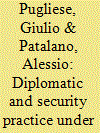

|
|
|
|
|
| Summary/Abstract |
In what ways are Japanese foreign and security policies changing? How far will these changes go? Will they result in a policy posture that breaks from the post-1945 approach as originally designed by Prime Minister Yoshida Shigeru? This special issue presents six articles that address these questions. They tackle the relationship between recent changes in Japanese domestic policy institutions and Japanese diplomatic and security practice. In this introduction, we outline the significance of the essays’ findings and propose a methodological shift in the interpretation of Japanese policy. We make the case that Japan’s approach to diplomatic and security affairs under Abe is evidence of the emergence of a ‘Realpolitik Japan’. From this perspective, we argue that values and political ideology have translated into practical choices that make the question of the ‘break with the post-1945’ approach less relevant to understand the significance of political change.
|
|
|
|
|
|
|
|
|
|
|
|
|
|
|
|
| 3 |
ID:
175662
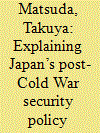

|
|
|
|
|
| Summary/Abstract |
Why has Japan shifted towards a more active security posture since the end of the Cold War? Japan’s security policy under Prime Minister Abe has triggered numerous discussions on the changing nature of Japan as a security actor. This article identifies two independent variables—the balance of power calculations and secure access to the maritime commons—that informs Japan’s security policy trajectory. It argues that Japanese strategy is best described as ‘maritime realism’, a posture in which liberal internationalist and realist elements draw upon principles of maritime strategy to fuse together. Japan has not only actively facilitated US commitment to maritime Asia but also focused on expanding its role in maritime security as the maritime space in the Indo-Pacific has increasingly become a contested space. While Tokyo’s security policy corresponds with structural realist predictions, they have also been frequently expressed in liberal internationalist language given the peculiar nature of the role of navies. This article’s findings advance theoretical debates on alliance politics and great power competition by integrating international relations and concepts in strategic studies. It also contains significant explanatory power in assessing the trajectory of Japan’s defence policy since the end of the Cold War.
|
|
|
|
|
|
|
|
|
|
|
|
|
|
|
|
| 4 |
ID:
175660
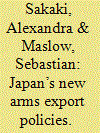

|
|
|
|
|
| Summary/Abstract |
This article examines the significance of the changes in Japan’s arms export policy following Prime Minister Abe Shinzō’s return to power in 2012—a topic which has so far received insufficient scholarly attention. Established in the 1960s and 1970s, Japan’s ‘virtual’ ban on arms exports was an expression of the country’s postwar anti-militarism. Yet, in keeping with Japan’s increasingly active role in security affairs, Abe lifted the ban on weapons exports in 2014. Within the Ministry of Defense, a new agency was installed to oversee the arms industry and to promote military-related research and weapons transfers. We show that the Abe administration conceives of arms exports and related cooperation as an integral part of its national security strategy. Tokyo not only hopes to improve the competitiveness of its own defence industry, but also seeks to cement existing and new security partnerships while contributing to regional capacity building as a hedge against a rising China. The actual ramifications of this policy change are far from clear yet, however. A major constraint for policymaking is the reluctance of the defence sector to embrace arms export due to the associated business risks including the fear of tarnishing their corporate image.
|
|
|
|
|
|
|
|
|
|
|
|
|
|
|
|
| 5 |
ID:
175661
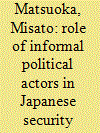

|
|
|
|
|
| Summary/Abstract |
Japan’s security policymaking has undergone change since 2012 amidst institutional reforms under the second Abe Shinzō administration. This article explores the under-appreciated role of informal political actors—especially heavyweight academics—in shaping Japanese security policymaking under the second Abe administration. Although these actors have always been present, this article argues that they have become more visible and influential, especially under the second Abe administration by supporting Japan’s Realpolitik stance. Differentiating from ‘embedded scholars’ (goyō gakusha), it scrutinises whether the activities of academics have become more relevant as part of a more centralised policymaking process. Considering the existing literature on Japan’s security policymaking and Kantei diplomacy, this article examines the extent to which informal political actors have exerted influence on Japan’s security policymaking, with explicit comparison with earlier governments. It particularly focuses on the role of Kitaoka Shin’ichi, a Japanese academic who has played the central role in shaping Japan’s security policymaking in the post-Cold War period. In so doing, this article explores the ways in which Abe’s Kantei-led political decision-making style has empowered informal political actors to contribute to strategic thinking regarding Japanese foreign and security policy.
|
|
|
|
|
|
|
|
|
|
|
|
|
|
|
|
| 6 |
ID:
175664
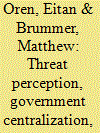

|
|
|
|
|
| Summary/Abstract |
In this paper, we review the International Relations literature and derive from it certain expectations of how government centralization may affect threat assessment, and from these, generate formal hypotheses. We then test these against the evidence of the extensive structural changes within Japan’s national security apparatus and the government’s threat perception in the period spanning the first and second Abe administrations (2006–2018). Drawing from official government documents, we find marked change to certain metrics of Japan’s threat assessment beginning in 2013, the first full year of the second (and current) Abe Administration. We argue that political instrumentality, and in particular, Abe’s policy agenda of breaking the constitutional status quo and resolving the territorial dispute with Russia, were paramount in shaping official threat assessment during this period (2012–2018). Our findings lend evidence to both the scholarships on threat perception and government centralization, as well as to the debate of Abe’s legacy in Japan’s post-war security policy.
|
|
|
|
|
|
|
|
|
|
|
|
|
|
|
|
| 7 |
ID:
175659
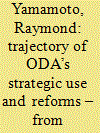

|
|
|
|
|
| Summary/Abstract |
Japan’s Official Development Assistance (ODA), one of the country’s most important foreign policy instruments, was until recently regarded as a prime example of a bureaucratic-led and fragmented decision-making system. Nevertheless, Prime Minister Abe Shinzō has held great control over ODA, using it for his political goals. This paper focuses on Abe’s efficient employment of ODA analysing the ODA-related administrative reforms he implemented. The analysis also looks at the ODA’s history to include reforms since the time of Prime Minister Nakasone Yasuhiro in order to unravel the roots of Abe’s influence. Yet, the analysis concludes that the prime minister’s increased authority is not followed by a static and predictable ODA strategy.
|
|
|
|
|
|
|
|
|
|
|
|
|
|
|
|
|
|
|
|
|